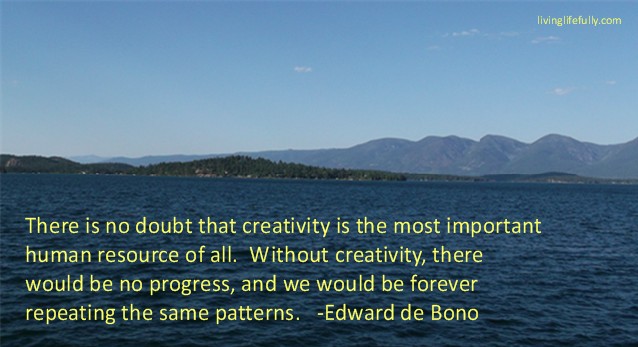| |
|
May
25 |

|
|
| |
|
Today's
Quotation:
At its root, the
ad for the new boat wants you to feel unhappy,
discontent, lacking, inferior,
temporary. Because materialism--in
essence, the doctrine
suggesting that things, not relationships, make
the world go
around--is a replacement for something else. And
when we're
content with that something else--the something else
you can't buy with
a credit card--we won't need to adorn our lives with the unnecessary
goods and services being flashed before us at every turn.
Bob Welch
|
|
Today's
Meditation:
I
was born with a sort of innate disgust at being
manipulated. I've always hated it when people try to
manipulate me by trying to get me to do something or think
something. Fortunately for me, this meant that I
learned very early to recognize what was going on with
advertising. They were trying to make me feel bad
about myself, bad enough so that I would go out and buy
whatever product was being advertised.
We
do have many positive, productive advertisements in our
culture. But most of them are based on one goal--to
make the consumer feel dissatisfied with his or her current
life condition. Car commercials imply that buying
their model will help a man to meet more--and more
desirable--women. Make-up commercials imply that a
woman currently isn't attractive enough, or that she's
somehow "flawed," and their product will help to
hide the flaws. Food commercials try to convince us
that we'll be happier or healthier or that life will somehow
be better if we eat their products.
But
we're also taught that true happiness comes from within, so
these commercials create a tension that most of us just
don't understand on a conscious level. We go through
our lives hearing these assaults on our self-concept, but
even if we reject them on a conscious level, we still face
the nagging questions and possible self-doubt that they
leave with us. "Perhaps I would be happier
with a new living room set," we think.
"After all, it would probably be more
comfortable."
But
our true needs are simple. There's nothing wrong with
fulfilling wants, but our needs are another thing.
Most of what we see advertised is completely unnecessary,
and we usually don't even want it until we see the ads.
The
key, of course, is to maintain our awareness of what is
truly necessary and what is not. But we also need to
maintain our awareness of what the people who make the ads
are trying to make us feel with their words and
images. If we can recognize that, then the battle's
half won.
|
|
Questions to ponder:
1. Have you ever bought anything
that you didn't really want
because of a really good ad?
2. Why is "buyer's
remorse" such a common phenomenon?
3. Think of an ad that you find
particularly objectionable. What do the ad-makers do to make you feel that way? |
|
For further
thought:
Advertising
is based on creating dissatisfaction, on making people
want more than they have, look different than they look,
go places they've never gone. It's based on the idea of
creating a need where previously no need was seen. A
"Calvin and Hobbes" strip put it well, when
Hobbes points out to Calvin that his emotional well being
depended on a need that wasn't there until he happened to
read an advertisement for a product. This kind of
dissatisfaction, though, is destructive rather than
productive. It's dissatisfaction based on ownership (or
lack of), materialism, and aesthetic appeal, but not
dissatisfaction based on the truly productive ways of
improving ourselves.
tom
walsh |
|
| |
|

|
| |
|
quotations
- contents
-
welcome
page
-
obstacles
our
current e-zine
-
the
people behind the words
-
articles
and excerpts
Daily
Meditations, Year One - Year
Two - Year Three - Year Four
Sign up
for your free daily spiritual or general quotation ~ ~ Sign
up for your free daily meditation
 |
tm |
|
|
All contents © Living Life
Fully, all rights reserved. |
|
| |
| |
|

|
| |
|

|
We
have some inspiring and motivational books that may
interest you. Our main way of supporting this site
is through the sale of books, either physical copies or
digital copies for your Amazon Kindle (including the
online reader). All of the money that we earn
through them comes back to the site in one way or another.
Just click on the picture to the left to visit our page of
books, both fiction and non-fiction! |
|
| |
|
|
